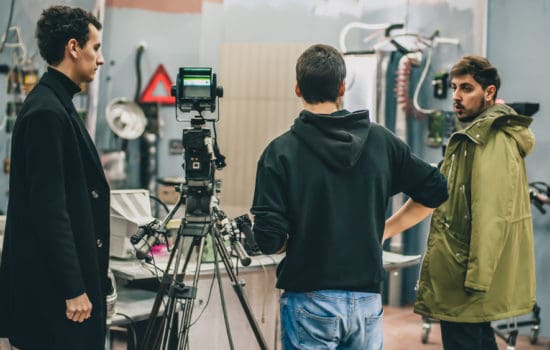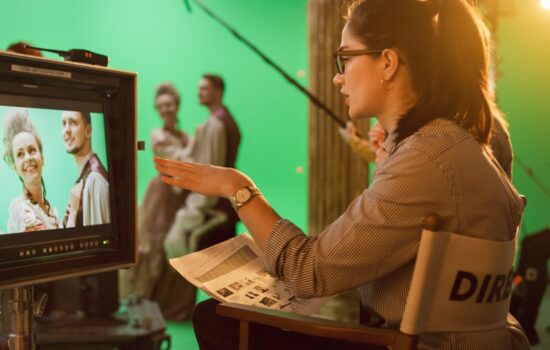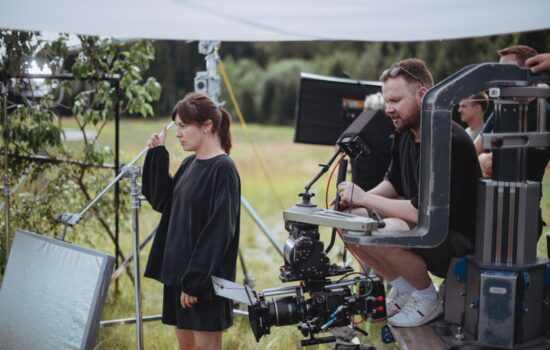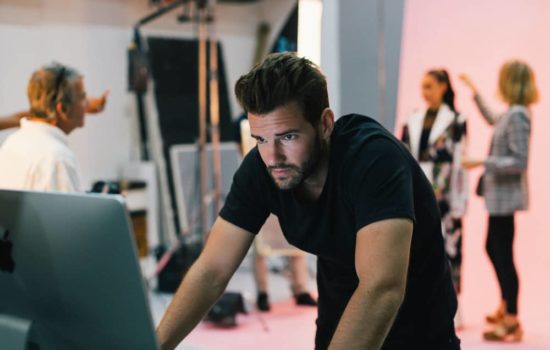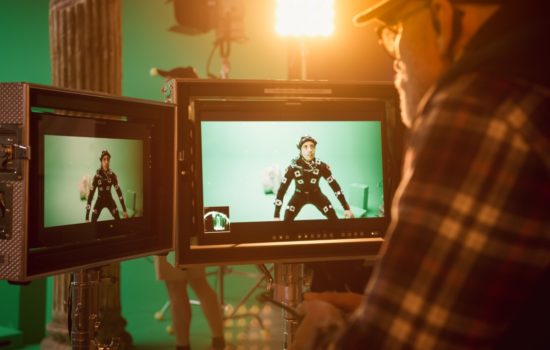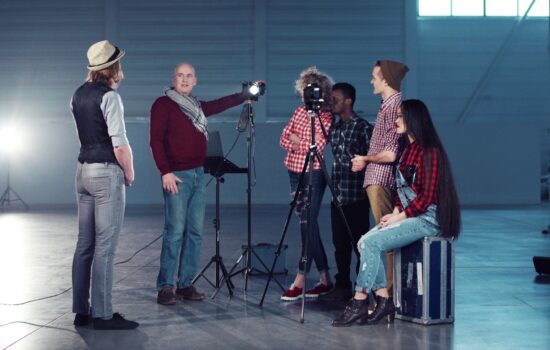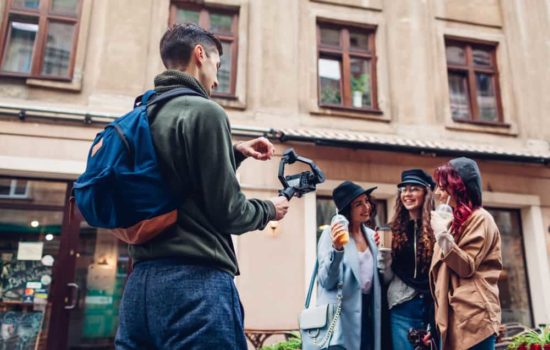2nd AC (Second AC)

How To Become a 2nd AC (Second AC)
Career Description
The Camera Department has several different key careers within it. The 2nd Assistant Camera oversees maintaining all technical support gear, including lenses, filters, and diffusion. They make sure that every gadget for the camera is accounted for, which can become quite cumbersome due to the ability of professional cameras to be modified for so many different scenarios.
2nd ACs are also in charge of logging all aspects of a setup for the Camera Department. This includes setting marks for the Actors so the 1st Assistant Camera can pull focus. Due to the ever-increasing resolution of cameras, what is in focus is becoming more and more precise.
Therefore, finding exactly where an Actor will stand allows the camera team to set marks on the camera itself so when they’re racking focus it’s based on mathematics and not on someone trying to gauge what the shot looks like off a small screen. (Basically, what looks to be in focus on a screen the size of an iPad will not hold up in a movie theater.)
Beyond that, the 2nd Assistant Camera keeps a report on every shot, including camera settings, what lens was used, and distance from the subject. This information can be used to create a unified aesthetic on a production or if the film is shooting coverage, to precisely match the reverse camera shot with an identical lens and distance. Their final task is to slate the scene and run media to the Digital Imaging Technician for backup.
This may seem simple; however, the slate matches each shot to a specific scene number and take, effectively organizing the entire production. The media is everything that has been shot for the past couple of hours. If it gets screwed up, then footage is lost and the Editor will take extra days setting up the project, which can cost the film a pretty penny.
The overall job of a 2nd Assistant Camera consists of supporting the Camera Department. They must be in close contact with the 1st Assistant Camera to make sure that they are staying ahead of each setup and time is not lost. Often, the 2nd Assistant Camera will also manage the Camera Production Assistants and Camera Utility people as well.
What is a 2nd AC?
A 2nd AC, also referred to as the 2nd Assistant Camera or Clapper Loader, is part of the camera department on a film set. Among their various duties, the 2nd AC typically readies the camera magazines, marks the Actors, maintains the camera records, and slates the beginning of each take.
Salary
The average annual salary for a 2nd Assistant Cameraperson is approximately $50,600. The salary range for a 2nd Assistant Cameraperson goes from $42,000 to $62,000.
Working as a 2nd Assistant Cameraperson is a freelance position with no benefits.
Lanas says, “Sometimes there are very cool projects that a person will get excited about and then realize that they won’t be able to pay their rent. Starting out, people will only pay a little bit because that 2nd AC is new.
However, a person should be at least making $150 dollars for twelve hours. As a 2nd AC’s experience expands they can pull in more money. It’s up to them to make sure that they’re getting paid what they’re really owed.”
Negotiating pay isn’t easy, especially if someone hasn’t worked for a month. It’s always good to try and bargain a little bit if someone has the experience on their resume to back it up.
How much do 2nd ACs make?
The salary for a 2nd AC is dependent upon a number of factors, including their experience and union status. If they’re working regularly, a 2nd AC can earn an average of just under $51,000 a year. A veteran professional who frequently works on bigger budget projects can earn more, while a novice 2nd AC might earn a fraction of that amount when just starting out.
Hey, what do you think about trying our new Film Career HelperFilm Career Helper really quick? It’s totally free and could help get your career moving fast! Give it a try. It’s totally free and you have nothing to lose.
Career Outlook
The work schedule of a 2nd AC is really all over the place, due to its freelance nature. Lanas states, “Sometimes a person will work for two weeks and then be unemployed for four weeks. It’s hard to say. The only consistent factor is that whenever a film set is going for principal photography, the 2nd AC must be there. So expect to work weird overnight hours and weekends, as well as day shifts.
“If the production is organized then they’ll give decent turnaround times between days. If not, then expect to grind it out. Most of the time, though, if a 2nd AC is working on a feature, they’ll be doing five days a week from 7 am to 7 pm. The long hours and flexible schedule can make it tough to have a social life or build a family.”
The 2nd AC is a crucial element of production and when they sign up for an opportunity it means giving away their freedom. It’s important to understand that the insanity of working on set never goes away, not even after twenty years of experience.
The 2nd Assistant Camera is on set interacting with everybody but they work most closely with the Director of Photography, the Camera Operator, the 1st AC, and DIT. Sometimes, if it’s a large shoot, there will be multiple camera teams and 2nd ACs to go along with them. They’re usually delineated by a letter, as in A Team and B Team.
If that is the case, the 2nd AC will predominately work with their own team but share equipment and resources with the other one.
Career Path
Advancement within the Camera Department usually comes from experience. The best way to get in is to work as a Production Assistant or a Camera Utility. Those positions don’t need a lot of experience. They act almost like an Intern, learning what each position in the Camera Department does and supporting them with simple tasks.
Lanas says, “What I did was PA for the first few days on a feature, talking to camera guys and expressing interest to the producing team so they’d let me work more with them. That was a good approach for breaking in. That’s how you can really get started, working with the Camera Department, specifically.
“Another little route you can take is to work at a camera rental house. You’ll learn the equipment for sure. It’s also a good way to meet camera guys when they’re doing prep.”
Working in a rental house is a good option because getting hired comes through a lot of social connections. After someone breaks in as a PA and works for a year or so they’ll be able to move up to becoming a 2nd Assistant Camera.
Becoming a 2nd Assistant Camera doesn’t come through a typical promotion. It comes from learning how to do it on the job by watching others and slowly stepping up to taking on tasks either until a 1st Assistant Camera is comfortable hiring them or until a person can confidently apply to 2nd Assistant Camera jobs. As a freelancer, it’s up to the individual to determine if they’re ready to start applying for the next level of work.
Lanas notes, “The cool thing is as a 2nd AC, a person can start noticing different routes they can take, like becoming a 1st AC or a Digital Imaging Technician or [working in] a different department on a film set. Getting hands-on experience like assisting in building a camera, running digital media, and keeping track of the slate puts the 2nd AC in contact with a lot of other departments. They’re there for every shot, watching what happens.”
Getting practical experience as a 2nd Assistant Camera is good for learning the Camera Department to make sure it’s a good fit but also examining other departments to see if a person’s interests are better suited there.
Lanas says, “On almost every job I’ve worked, it has been important to be social because a person is spending about twelve hours a day with their co-workers. It’s important to practice small talk and be sensitive about bothering other people.
“Personally, being introverted, I had to learn how to work with others. Working on film sets is a good opportunity to practice opening up. Essentially, the more a personal connection is made, the greater chances a rehire will happen, which gives more experience and helps a person advance in their career.”
Lanas’ methodology also works for landing a first job on set. If someone works in a rental house, makes contacts through a trade school or film school and is friendly, then it’s more likely that someone will give them their first shot at being on set.
- It’s important for a person to clean up their social media and online presence. If a boss sees drunken pictures or a post that is abrasive they may not hire a potential candidate.
- Get on set to learn firsthand.
- Make a resume and keep it updated. There are tips on the facebook page for TheBlackAndBlue.com for making one.
- Practice writing little cover letters. It only needs to be one or two paragraphs when applying for a job.
- Practice socializing. It can make or break a career.
Experience & Skills
“Being color blind could hinder a person,” jokes Lanas about any special skills required for becoming a 2nd AC. He goes on to say, “There isn’t a bar exam or anything like that. What’s most important is being familiar with the camera that’s being used. It’s always good to review its manual online and watch some tutorials before stepping on set. There can be lots of bits and bobs that need organizing or have a specific purpose.”
The 2nd Assistant Camera helps the 1st Assistant Camera with maintaining the equipment. Therefore they need to be a good communicator and attentive to the equipment that will be used. Since a 2nd AC is closer to an entry-level job, a person can get away with less practical experience if they can supplement it with a good understanding of gear.
“The personality of a 2nd AC requires humility and an understanding of onset etiquette,” says Lanas. He elaborates, “A lot of people may be ambitious and desire to work as a Cinematographer or other position, copping a know-it-all attitude. They’ll walk right up to the Director and say, ‘Why don’t we do this?’ There is no faster way to get fired off a film set.
The 2nd AC’s job is to support other people’s visions. If there is a pressing problem they notice then it’s their job to inform the 1st AC and let him send it up the chain of command.” Keeping a positive attitude and understanding the hierarchy of a film set is crucial. By respecting boundaries a 2nd AC will keep their job and create more opportunities for their future.
What is the 2nd AC responsible for?
The 2nd AC is a vital part of the camera department and provides substantial support for the rest of it. In addition to their common responsibilities of slating each take, marking the Actors, maintaining camera records, and readying the camera magazines, they often help the Camera Operator position the camera and making sure it’s set up for each take. To that end, the 2nd AC will change out batteries, lenses, and other components of the camera.
Education & Training
The traditional route of film school is an option for becoming a 2nd Assistant Camera. There students will learn about various departments, including camera. However, Lanas recommends a different path. “I’m not sure how much film schools teach about detailed responsibilities for a 2nd AC on a film set. It probably varies from school to school; however, a four-year degree can be overkill. My recommendation, what I did, is a trade school.
“It was a one-year school for below-the-line crew in Tennessee that grants a certificate. It taught all the equipment and gave a solid foundation. Additional knowledge can be acquired through websites and online tutorials.” These fundamentals will prepare someone for effectively working on a film set. Once on set, the education continues.
Additional Resources
Lanas recommends various websites as online resources. He says, “TheBlackAndBlue.com is a very extensive blog run by an Assistant Camera. I didn’t learn much of what’s on there in my school program. It’s almost like the bible of camera assisting.
“Also, check out a lot of manuals for cameras. They can be Googled. It’s most important to look at what types of cameras a person will be using first. Some of these include the Canon DSLRs, Canon C300, Canon C500, Sony FS7, SONY A7S, and GoPros. These cameras are often used by indie features and short films.”
Regarding online groups, there is Cinematography.com, the National Association of Broadcasters website, and various Facebook groups.
StaffMeUp.com is also a good website if a person is looking for gigs. Overall, an interested person should be trying to learn as much as possible about camera technology so they can be a better asset on set. Doing that will allow them to be a better collaborator in the Camera Department.
Finally, the Camera Assistants Union is a strong advocate for working conditions and getting fair pay for honest work. Each union is a Local so they have different joining requirements and provide different services. It’s best for an individual to research their area and find out what the specifics of getting accepted are.
FAQ
What is the single biggest suggestion you would give to someone wanting to get into this career?
“The biggest suggestion for people looking at becoming a 2nd Assistant Camera is to be ready to work hard and always understand the equipment being used. Many people can get lazy through familiarity. However, it only takes one bad job to blow a relationship and not get rehired.
“So many people are looking for opportunities that if a 2nd Assistant Camera drops the ball, there will be someone to take their place. But that isn’t enough. A person needs to remember to be social so when it comes time for a recommendation their name is at the top of the list.”
What’s the #1 mistake people make when trying to get into this career?
“The biggest mistake a person can make when working as a 2nd Assistant Cameraperson is to run their mouth. If they try and run the whole show or give ideas when their opinion wasn’t warranted a bad impression will be made.”
“Time is money on a film set and nobody cares about hearing everyone’s ideas, especially if that person is low on the totem pole. It can be easy for someone to work on a couple of sets, watch a lot of movies and think that they know everything.”
“There is a lot of craft that comes from practical experience. Even something as basic as switching lenses can be very complicated, depending on the glass. So, it’s important for a person to not get discouraged, but learn everything they can, and save their great ideas for later in their career when they’ll be more readily heard.”
What is the question people should ask about this career but rarely do?
“Do you have any other recommendations for breaking into the business?
“When trying to build a resume it can sometimes be helpful to take free work. If this approach is taken, it’s important for an individual to realize that they are there to build relationships and prove the quality of their work ethic.”
“Therefore, it’s important to make sure that these favors are only granted to people that could potentially provide paid work in the future and to be as respectful as possible. If someone keeps a great attitude after a fourteen-hour day without any pay then a 1st Assistant Director or Director of Photography will definitely remember them for future projects.”
What is one thing I should have asked which I didn’t?
It’s important for a 2nd AC to wear the right clothes. Everything they wear should be dark or completely black. If they have on obnoxious or bright colors it could throw the shot off, due to reflections.
“It’s also a very subtle way of saying that a person is there to work. They take this seriously and can be counted on. While this might seem like a minor detail it only takes one mistake to make a bad impression in a business as competitive as this one is.”
If you could describe in one word what makes you successful, what would it be?
“Friendly.”
Sources
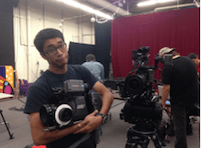
Sed Lanas
Sed Lanas is a 2nd AC based in Los Angeles who has worked on various narrative feature films, television, and commercials. Some of his past projects have included Memory Thief, The New Wife, Her Forgotten Daughter, American Crime Story (season 2) and Giving Up My Ground. He’s originally from Tennessee.
References
- 1Multiple. "Camera Assistant Salary in the United States". Salary.com. published: Dec 12, 2019. retrieved on: Dec 12, 2019
- 2Multiple. "Camera Assistant Salary in the United States". Salary. published: Dec 12, 2019. retrieved on: Dec 12, 2019
- 3Multiple. "Camera Assistant Salary in the United States". Salary. published: Dec 12, 2019. retrieved on: Dec 12, 2019
